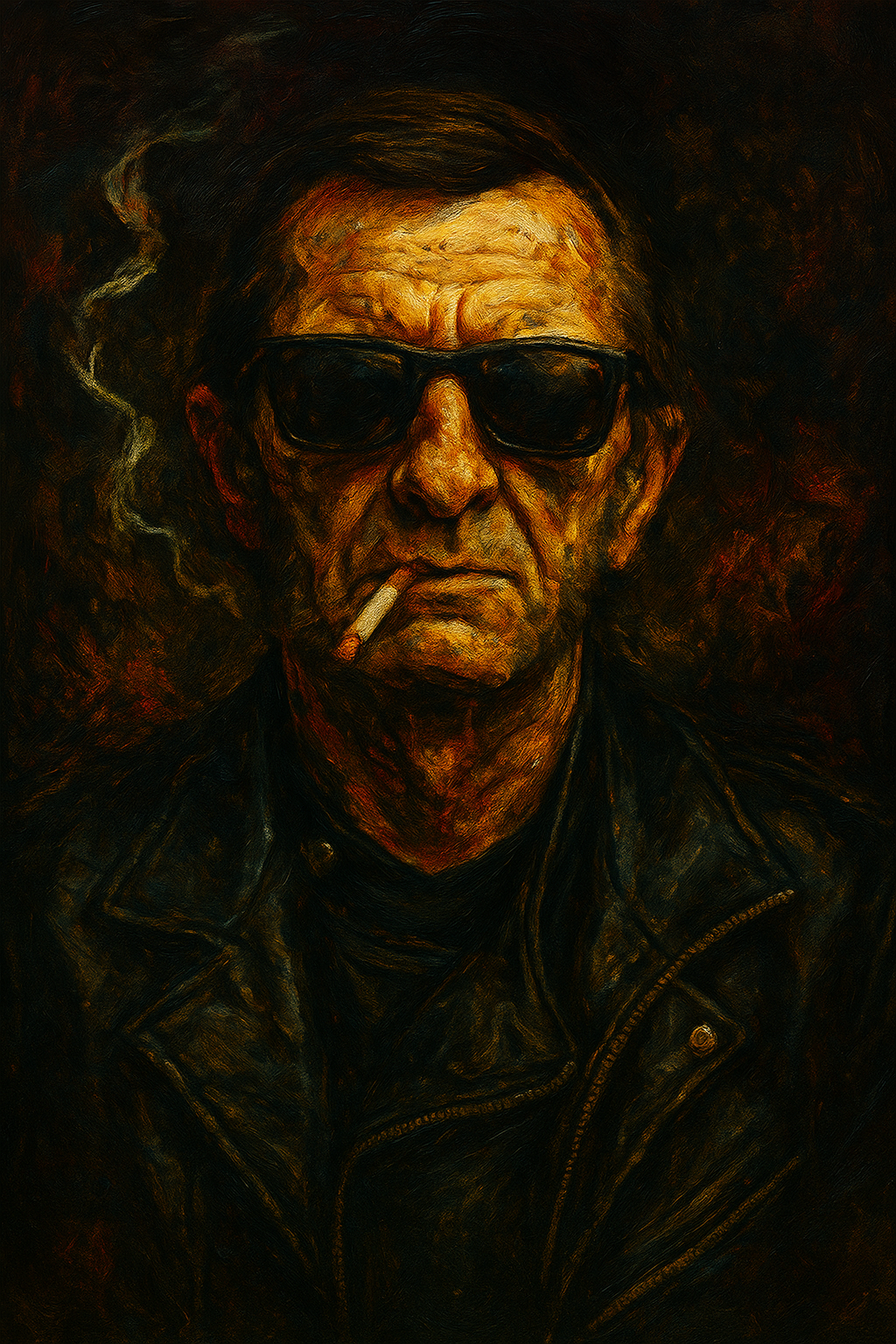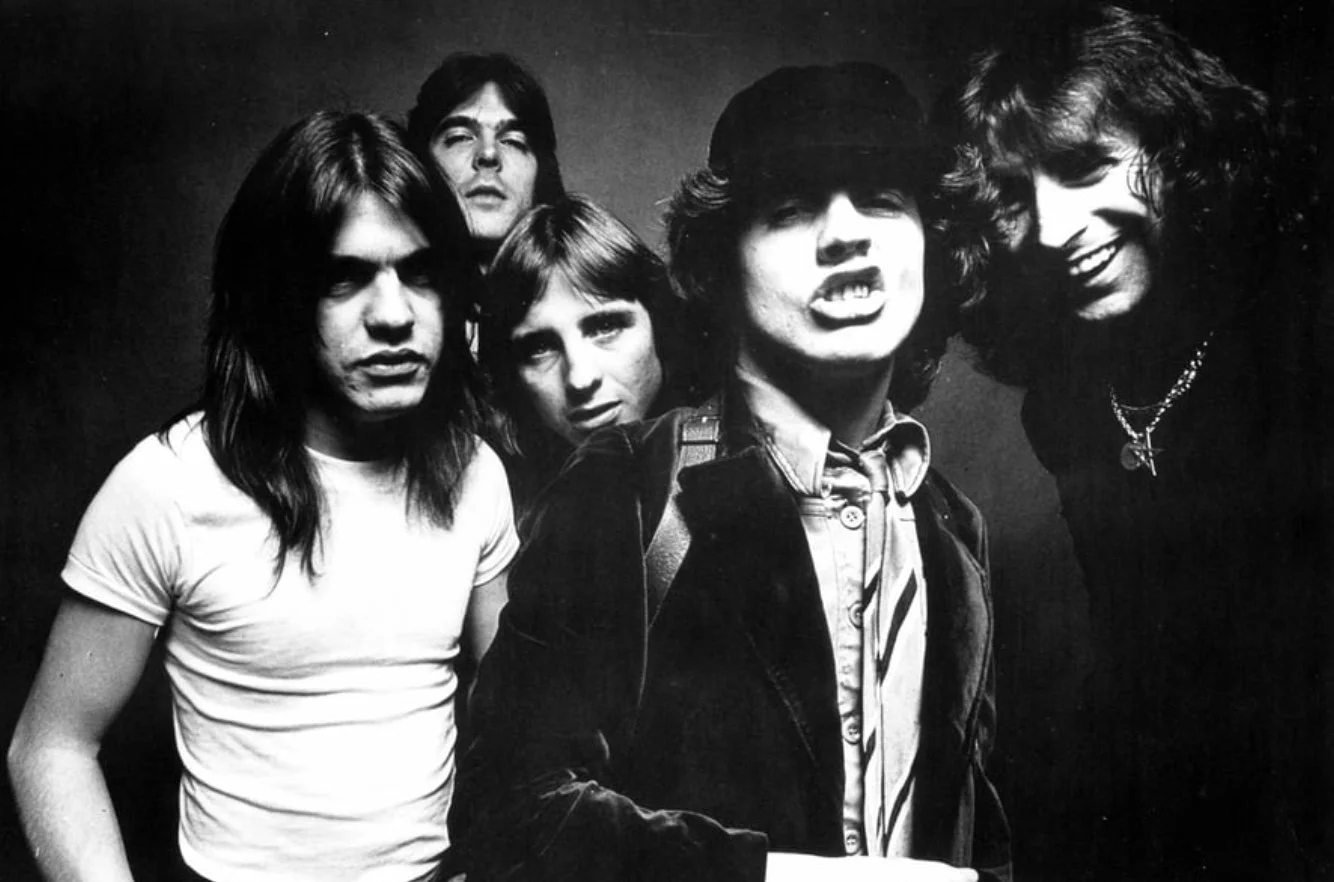Phil Rudd: Bukowski with a Backbeat
Eight o’clock on a wet Wednesday night in Sydney. A man in sunglasses is circling a pool table, cigarette clamped between his lips, playing air guitar on a cue stick to the sound of his own record. To the uninitiated, he looks like a drunken regular, one of those lifers who drift from bar to bar until the city blurs into ashtrays and beer stains. But this isn’t just another barfly. This is Phil Rudd—drummer for AC/DC, architect of the most primal groove in rock ’n’ roll, and a man who’s spent the last fifty years dancing between genius, chaos, and the courts. Back in 2014, Classic Rock writer Rod Yates spent some time with Rudd, and this vignette reveals perhaps more about the man than a hundred interviews over the years, with Rudd famously staring at his watch, uttering clipped responses to the same stock questions and offering as little personal collateral as possible.
Rudd never oozed rock-god glamour. He never aspired to the concussive dimensions of John Bonham’s thunder, not Neal Peart’s philosopher-king precision. Phil Rudd is a contradiction—weathered by time and excess, yet eternally youthful in step. He smokes Rothmans in five-star hotels, flies helicopters over the Bay of Plenty, and talks in a barely audible mumble that makes journalists lean in like priests trying to decipher oracles. As Yates put it, he “spoke in a barely audible mumble that concealed much of what he was saying.” A whisper offstage, a cannon behind the kit.
In 1975, Phil Rudd was just another kid in Melbourne when he heard about a new band called AC/DC looking for a drummer. His version of the story is disarmingly simple: “I turned up, played and was offered the job. It was that simple. The rest is history, as the saying goes.”
He walked into a house on Lansdowne Road in East St Kilda—a squalid crash pad filled with musicians, booze, and “a lot of weird people.” That was the AC/DC incubator: no-bullshit guys, cocky, ambitious, and hell-bent on world domination. “Short guys,” Rudd remembered with a laugh. “They were quite aggressive, but very ambitious and determined to succeed.”
While Bon Scott charmed the world with his devilish grin and Angus Young duck-walked his way into the rock pantheon, Rudd simply sat down, hit the snare, and locked into a groove so deep it would eventually carry AC/DC to 200 million albums sold. He didn’t chase fills. He didn’t decorate. His gift was subtraction. “It’s a process of suspension and release,” he once said. “It’s like having sex, you have to find the right groove.”
If AC/DC had wanted glamour, Rudd wasn’t their man. This was no boisterous pretty boy like Keith Moon, nor a suave stickman like Charlie Watts. Rudd looked like a truck driver on the wrong stage—and that was his genius. He radiated pub energy in front of stadium crowds. He was, in essence, a Bukowski character in a rock ’n’ roll circus: chain-smoking, aloof, uninterested in fame. His contradictions were comic and tragic. And yet beneath it all rested the implicit understanding that Phil Rudd was not a man to be fucked with.
Bukowski characters aren’t remembered for serenity, and Rudd’s life spiraled into chaos more than once. The first time came in 1983. By his own half-mumbled admission: “I don’t remember… Or, yes, I was sacked. I think that they regretted that.” The split was fueled by the usual toxins—booze, burnout, and too many miles of the rock ’n’ roll conveyor belt.
He returned in 1994. Ten seconds into the jam, the band knew it was right. The groove was back. The engine room restored.
Then came 2014. By then, Rudd had finally released Head Job, a slab of pub-rock he’d been tinkering with for decades. But instead of being remembered for the music, he detonated headlines. Furious about the record’s promotion, he allegedly threatened to have someone killed. In a gonzo twist worthy of Bukowski, the man who could barely be heard in interviews was suddenly screaming across the tabloids. He was charged with threatening to kill and drug possession. Convicted, he served eight months of home detention in New Zealand.
The fall was absurd, Shakespearean, and weirdly comic. His own words sum it up best: “I’ll accept my mistakes. I like it my way.”
But here’s the paradox: for all the chaos and dysfunction, AC/DC without Phil Rudd just doesn’t sound right. Fans knew it. The band knew it. As Rudd himself noted, “Being a drummer in AC/DC you are the boss of the engine room, and you have to assure that all the parts are kept together.”
Chris Slade, Simon Wright, even the brilliant Matt Laug—good drummers all. But as Rudd said of his replacements: “Simon Wright didn’t do a bad job. But, the other guy, I don’t think suited that well. He didn’t have the groove.”
Groove is Rudd’s dominion. It’s primal, elemental. Malcolm Young may have been the secret architect of AC/DC’s riffs, but Phil was his shadow, the bedrock under Malcolm’s right-hand rhythm. When Malcolm passed, it was Phil’s reappearance that felt like the last surviving link to that primal, sacred energy.
In 2017, at Malcolm Young’s funeral, Angus and Phil buried the hatchet. “Angus and I had a good chat at Mal’s funeral and caught up,” Rudd recalled. Angus backed him up: “It was really good.” Brian Johnson was even more direct: “We defend Phil to the hilt.”
That reunion led to Power Up in 2020, the band’s triumphant late-career return. Rudd, who had once nearly sunk himself in Rothmans and legal drama, was suddenly steady again. Johnson said it best: “He’s really looking brilliant now and doing everything great.”
By 2025, at 71 years old, Rudd found a new stage. In Auckland, he sat behind his kit at the “Full Metal Orchestra” concert, blasting through “Thunderstruck” and “Back in Black” while a 29-piece orchestra tried to keep pace. Rudd didn’t bend to the orchestra—the orchestra bent to him.
He had promised: “It’s going to be thumping, boom boom, bang.” And that’s exactly what it was. Proof that you can take the man out of AC/DC, but you can’t take the backbeat out of the man.
Phil Rudd is not a saint, not a showman, not a virtuoso. He’s a survivor. He is what Bukowski would have called a professional drunk with rhythm. He’ll whisper his answers in fragments, he’ll swing a pool cue like a guitar, he’ll vanish into chaos and return as if nothing happened. And when he sits behind the kit, all the contradictions melt away.
Because when Phil Rudd hits the snare, it isn’t a drum. It’s destiny.



